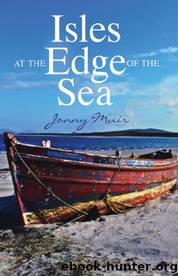Isles at the Edge of the Sea by Jonny Muir

Author:Jonny Muir
Language: eng
Format: epub
Publisher: Sandstone Press Ltd
11 â Rum
On a good day, Rum appears majestic and heroic. On a bad day, it appears to have the largest, most vicious midge population in the northern hemisphere.
Lesley Riddoch
Pinned to a notice board in the visitor centre on Rum is a large black and white poster. It was the first item in the room to catch the eye. Above the words âthe Rum midgeâ, a swarm of the insects, human-sized, their teeth poised and sharp, attack a group of terrified men, women and children. The mesh nets worn over their heads are futile, for the people are encircled by the enemy. Striking with fantastic speed, the midges show no mercy, no pity for their victims. There is no escape.
The dreadfulness of their plight is reminiscent of a scene from a horror movie. If only the poster was being ironic. If only this was fiction.
I camped, with well-founded trepidation, pitching my tent next to the shore of Loch Scresort. I would stay here for two nights. My fate depended on the elements. If the wind blew, there would be no midges. If the wind dropped, they would eat me alive. For now, surrounded by forest, mountain and sea â and silence â Rum was a marvellous, midge-free place to call home.
The campsite occupied a long, thin strip of grassland, the sea loch on one side, an undulating gravel road that connected the islandâs ferry pier and the hamlet of Kinloch, where all but one of the 40 human inhabitants of Rum lived, on the other. The plot was surprisingly well-equipped. Neat, wooden shelters packed with firewood â presumably to deter campers from venturing into the forest to hack their own â bookended the site. There were two hot-water showers and a block of toilets.
Taps delivering fresh water and basic trough sinks were dotted about the camping ground. The water, however, as on Eigg and Holy Island, came with a health warning. Environmental investigations by Highland Council had found the supply on Rum to be âat risk from bacterial contamination, which could be harmful to healthâ. A decree pinned to the wall of my nearest shelter went on solemnly: âCare should be taken not to swallow water while showering or bathingâ. Even using the water to brush your teeth seemingly carried the risk of a lingering, painful death.
It is temptingly easy to be blasé about such warnings: adopting an it-will-never-happen-to-me outlook on life, bemoaning how even Rum is unable to escape the clutches of officious health and safety. Yet to assume that because this was Scotland and because this was the Hebrides, the land would be free of animal or human interference, or not riddled with chemicals, would be naive. The risk of contracting water-borne infections of the ilk of E. coli and Weilâs disease are real and potentially fatal.
Even so, I chose to be blasé, ignoring the warning. I re-read the councilâs pronouncement. The key word was âcouldâ â the water âcouldâ be harmful to health. That one word created
Download
This site does not store any files on its server. We only index and link to content provided by other sites. Please contact the content providers to delete copyright contents if any and email us, we'll remove relevant links or contents immediately.
| Great Britain | General |
| Bath | Devon |
| Gloucestershire | London |
| Yorkshire |
Spell It Out by David Crystal(35365)
Underground: A Human History of the Worlds Beneath Our Feet by Will Hunt(11277)
A Year in the Merde by Stephen Clarke(4670)
Venice by Jan Morris(2058)
Claridge's: The Cookbook by Nail Martyn & Erickson Meredith(1974)
My Paris Kitchen: Recipes and Stories by Lebovitz David(1896)
A TIME OF GIFTS by Patrick Leigh Fermor(1853)
The Plantagenets by Dan Jones(1623)
Welcome to the Goddamn Ice Cube by Blair Braverman(1609)
Bang Poland: How To Make Love With Polish Girls In Poland by Roosh V(1595)
Top 10 Prague (EYEWITNESS TOP 10 TRAVEL GUIDES) by DK(1572)
From Russia with Lunch by David Smiedt(1555)
The Finnish Way by Katja Pantzar(1540)
The Isle of Mull by Terry Marsh(1523)
A TIME TO KEEP SILENCE by Patrick Leigh Fermor(1503)
Rick Steves London 2018 by Rick Steves & Gene Openshaw(1498)
A Taste of Paris by David Downie(1496)
Merde in Europe by Stephen Clarke(1439)
Insight Guides Experience Tokyo by Insight Guides(1422)
